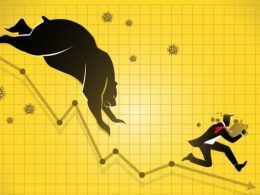Full Interview Transcript:
Consuelo Mack WealthTrack - July 1, 2011
CONSUELO MACK: This week on WealthTrack, Great Investor Steven Romick shows why surfing where others fear to swim has placed him in the top one percent of money managers. FPA Crescent Fund’s contrarian value manager tells us which investment waves he is riding now, next on Consuelo Mack WealthTrack.
Hello and welcome to this edition of WealthTrack. I’m Consuelo Mack. This week we are catching up with Great Investor, Steven Romick, portfolio manager of the five star rated FPA Crescent Fund, a go anywhere, invest in anything fund he launched in 1993. A noted value-oriented contrarian, Romick was a finalist for Morningstar’s first ever Manager of the Decade Award for being one of the fund managers that “served investors the best during the most trying decade since the Great Depression.” His 11% plus annualized returns over the last ten years placed him in the top one percent of money managers.
What sets Great Investors apart? Having interviewed my fair share of them on WealthTrack over the last six years, I have come up with some essential traits: intensity about their work, attention to detail, disciplined investment process, independence of thought and deed, and the ability to withstand the passions of the moment and hold their ground even if it’s not good for business. FPA Crescent saw 90% of its assets leave the fund during 1998 and 1999 when Romick refused to buy into the escalating tech boom and vastly underperformed the then very tech-heavy market. Needless to say, had investors stayed with Romick, they would have been far ahead of the pack over the next three years. He aced the market and competition over that five year period.
In order to educate potential and current investors and avoid a similar exodus in the future, Romick and the team at FPA recently published “the FPA Contrarian Policy Statement,” outlining their goal: “…to provide, over the long-term, an equity-like return with less risk than the stock market,” which so far they have done. The Contrarian Statement also outlines their philosophy, including being “absolute value investors,” their “long-term focus,” saying they have to “accept short-term underperformance in exchange for long-term success” and their “downside protection and risk minimization.” It also lays out the process they follow, as they put it, to “seek the out-of-favor, unloved, or misunderstood…we are, in a word, ‘contrarian.’” We’ll have a link on our website, wealthtrack.com. I began the interview by asking Romick about another FPA philosophy, that macro matters, and to give us his view of the big picture.
You were quoted recently saying that we're kind of at the respite between two crises right now. We know what the crisis was that we just came through, but what kind of a respite is this, and why do you think there is another crisis possibly that’s going to come down the road?
STEVEN ROMICK: Well, because sometimes the solution you use ends up just being a band-aid, and sometimes the medicine you're taking can actually cause another illness. I mean, you try and kill cancer cells with chemotherapy, and chemotherapy taken to its extreme can certainly kill you. So when you look at the financial crisis, we have just doped up the system to such a great degree, how it’s going to come back and bite us in the butt is our big concern.
Debt continues to increase at the government level in the United States, and there has to be a day of reckoning there. And so we fear that day of reckoning, because as we continue to finance this growth and get lower and lower return for it, we fear the need to repay it in the future. And not only repay it, it’s going to come quicker than we think, because our debt rolls, almost half of it every two years. So we're borrowing very short. About 44% of our national debt matures inside of two years.
CONSUELO MACK: So this is the huge cloud that you think is on the horizon. So in the meantime, let me you ask you how you're investing, because when you were on WealthTrack in the spring of 2009, you came on and I basically asked you, what are you buying? And you went debt, debt, debt. And it was absolutely the right thing to do. You did extremely well with the debt that you had. What, 38% of your portfolio at one point?
STEVEN ROMICK: At one point, it was 34%.
CONSUELO MACK: Thirty-four percent of the portfolio was in corporate debt. So it’s now down to 7% of the FPA Crescent Fund? So why, number one, have you fled bonds? And what are you replacing them with? But first of all, why are you out of bonds?
STEVEN ROMICK: Well, it’s not that we fled so much as the fact that over the last few years, things have worked out and some of the bonds matured. But in March of ’09, our yield on our portfolio was about 23%. The yield on the portfolio is mid single digits now. And most of those bonds mature in a year, year and a half or so. So there’s just not a great yield spread. So the starting yield is low, and interest rates are low overall. So the spread doesn’t look so terrible. The high yield spreads are about 500 basis points more than treasuries, but we don't want to get seduced just by the spread, because again, the starting yield’s so low. We just feel that we're not getting paid to play.
CONSUELO MACK: Is that telling me that you view the bond market as very risky? That’s why you're basically, you're almost at cash equivalents.
STEVEN ROMICK: I feel we're not getting paid to play. We're in the business of trying to equity rates of return with less risk in the stock market. And if we're going to go out and put up money at 6%, I think that we're not necessarily going to get equity rates of return there, particularly for the risk that we're assuming.
CONSUELO MACK: So what other areas are you avoiding at this point? And one of the goals is to avoid the permanent loss of capital. And I will quote the contrarian policy statement, “returns will be driven by not just what we own, but what we don't own.” So what are you deliberately not owning in the FPA Crescent Fund?
STEVEN ROMICK: Well, you just stated one of them. We're staying away from high yield bonds and distressed debt. We're also staying away from smaller cap companies, because smaller caps- and this is a gross generalization, it doesn’t mean that all small cap stocks are expensive- but small cap stocks are about as expensive as they’ve been as a group, as compared to large cap stocks given the last 20 or 30 years, over the last 30 years, since the early 1980s.
CONSUELO MACK: So avoiding small caps. I mean, I know you're also a bottoms up manager. Do you own any small caps at all?
STEVEN ROMICK: We have some, but our portfolio is tilted dramatically towards large cap stocks today.
CONSUELO MACK: All right. So why are large-cap stocks a place that you're interested in?
STEVEN ROMICK: Large cap stocks offer a few things to us. One, I mean, there’s a misconception. One of the myths about small cap stocks is that they grow faster than large cap. And they certainly can, because these companies are more nimble, but that isn’t necessarily the case. In fact, if you look at the earnings on a trailing five year basis for the Russell 1000, a large cap index, versus the Russell 2000, a small cap index, in fact the Russell 1000 has outperformed, the large cap index has outperformed for the last 15 years consecutively.
CONSUELO MACK: So this is on earnings growth rates?











